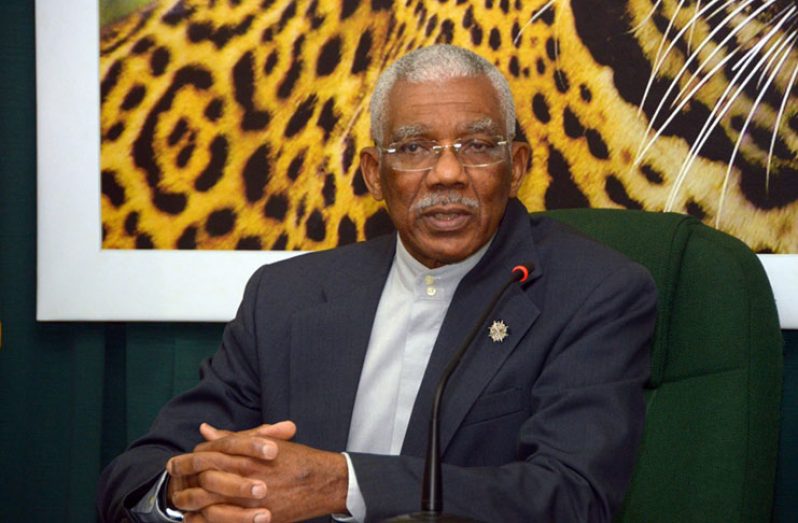–President says gov’t has done everything to bring industry to normalcy, profitability
By Navendra Seoraj
THE cash-strapped Guyana Sugar Corporation (GuySuCo) is expected to receive much- needed funds this week, said President David Granger.
It was reported that the Novel Coronavirus (COVID-19) pandemic and other prevailing national conditions have rendered the national treasury incapable of providing a bailout to the “cash-strapped” GuySuCo, but all hope is not lost, as the company is expected to benefit from $1.5 billion, paid to The National Industrial Commercial and Investment Limited (NICIL) for the sale of land.
“As the Ministry of Finance announced, we have made arrangements for money to be available this week…this is considered as bridging finance,” said President Granger in a recent interview.
The finance ministry in response to GuySuCo’s request for a bailout, cited a $30 Billion bond backed by NICIL’s assets and guaranteed by the Government of Guyana, which was secured through NICIL to retrofit and revitalise the three remaining sugar estates.
During the period July 2018 to February 2020, $9,720,759,568 was disbursed to GuySuCo to fund its capital and operational expenditure – much of which was outside the terms of the bond.
Additionally, NICIL, through the Special Purpose Unit (SPU), sold lands that were vested to it, and as such garnered deposits of $2.1 billion.
According to the finance ministry, the full sum was used to offset bond payments that became due in May, 2020, and the balance of $1.5 billion for the lands will be paid over to NICIL when the vesting orders are signed and gazetted. The corporation will benefit from part of this sum.
In a letter to President Granger on May 15, close to a month ago, Chairman of GuySuCo’s Board of Directors, John Dow, said the sugar corporation was in a “dire financial crisis” with billions in debt, and insufficient finances to execute critical factory maintenance.
“Despite improvements in the productivity of cane, GuySuCo’s sugar production for the last two crops has fallen short of expectations and the current COVID-19 pandemic has exacerbated the problems experienced in meeting the 1st crop 2020 production targets…As a result, the cash generated from operations cannot meet the ‘outgoings’ particularly when external funding has been difficult to obtain,” Dow said as he painted a vivid picture of the financial challenges facing the sugar industry.
GuySuCo’s condition could dwindle even further if “crucial creditors” are paid, said Dow, noting that if the corporation takes this recourse the company would be out of cash before the second week of June.
In referring to the condition of the sugar corporation, President Granger said, “it is very unfortunate we are in this position. Throughout the tenure, we have been engaged in trying to resolve the issue of the industry.”
The incumbent A Partnership for National Unit and Alliance for Change (APNU+AFC) coalition had initiated the resuscitation of the sugar industry with the presentation of a “White Paper” to Parliament.
Minister of Agriculture, Noel Holder had unveiled Government’s White Paper on the Future of the Sugar Industry at the commencement of the 64th Sitting of the National Assembly. He had said the plan, dubbed ‘State Paper on the Future of the Sugar Industry’, will focus on the poorly-performing estates and have them shift from sugar to diversification.
To this end, government had retained three sugar estates and three sugar factories. Those estates are Blairmont on the West Bank Berbice, Albion-Rose Hall in East Berbice and the Uitvlugt-Wales estate in West Demerara.
Those estates produce approximately 147,000 tonnes of sugar annually, to satisfy the demand in the local markets (25,000 tonnes pa), CARICOM and regional (50,000 – 60,000 tonnes pa), USA (12,500 tonnes pa) and the World Market (50,000 tonnes).
In executing its plan to resuscitate the industry, President Granger said government had to make “hard decisions,” which included the retrenching of workers. But, despite the scaling down of the industry and provision and future provision of government bailouts, the President said there is no guarantee that the corporation could produce sugar at world market prices and function economically.
Scaling down of the industry had started under the People’s Progressive Party (PPP) administration, which, according to the president, also left the industry in a terrible state, as evident at the Albion Sugar Estate. And, even though there have been resuscitative measures, he believes this will continue to be the fate of the industry unless workers and managers generate sufficient profit and revenue, an achievement which would be in line with the coalition government’s vision of making the sugar industry efficient.
“We have done everything possible to return the industry to normalcy and even profitability…we will continue to help and not send anybody home…we want an efficient sugar industry which can produce sugar at competitive prices,” said President Granger.
The idea is to compete with Brazil, Cuba and other “heavy” sugar producers, but in order for Guyana to do that, the industry needs to be economically viable and feasible.



.jpg)








